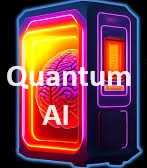In the realm of technological innovation, the convergence of quantum computing and artificial intelligence heralds a new era of possibilities. Quantum AI, a fusion of these two groundbreaking fields, holds the promise of revolutionizing how we approach complex computational tasks and unlocking unprecedented insights into the fabric of reality. Let’s embark on a journey to unravel the mysteries of Quantum AI, exploring its fundamental concepts, applications, and the transformative impact it may have on our world.
At its core, Quantum AI harnesses the principles of quantum mechanics to enhance the capabilities of artificial intelligence algorithms. Unlike classical computers that operate using binary bits, which can exist in a state of either 0 or 1, quantum computers utilize quantum bits or qubits, which can exist in multiple states simultaneously through a phenomenon known as superposition. This inherent parallelism enables quantum computers to perform computations at a scale and speed that far surpasses classical counterparts, laying the foundation for groundbreaking advancements in AI.
One of the key advantages of Quantum AI lies in its ability to handle vast amounts of data and process complex algorithms with unparalleled efficiency. Traditional AI algorithms often encounter limitations when confronted with large datasets or intricate problem-solving scenarios. However, Quantum AI algorithms, leveraging the immense computational power of quantum computers, have the potential to exponentially accelerate tasks such as optimization, machine learning, and pattern recognition.
Moreover, Quantum AI holds the promise of solving problems that are currently beyond the reach of classical computing methods. For instance, quantum machine learning algorithms can discern subtle patterns within datasets, uncovering insights that may have remained elusive with conventional approaches. Similarly, optimization problems, such as those encountered in logistics, finance, and drug discovery, can be tackled with unprecedented speed and precision using Quantum AI techniques.
Furthermore, Quantum AI has profound implications for fields such as cryptography and cybersecurity. Quantum computers possess the ability to perform calculations that would take classical computers an impractical amount of time to complete, rendering many traditional encryption methods obsolete. However, Quantum AI also offers the potential to develop quantum-resistant encryption techniques, ensuring the security of sensitive data in the age of quantum computing.

The exploration of Quantum AI extends beyond theoretical conjecture, with numerous research initiatives and practical applications already underway. Leading tech companies, research institutions, and governments are investing significant resources into advancing the frontier of Quantum AI, recognizing its transformative potential across diverse domains.
In addition to its practical applications, Quantum AI invites us to rethink our understanding of computation and intelligence. By probing the mysteries of quantum mechanics and integrating them with artificial intelligence, we gain deeper insights into the nature of reality and the limits of human cognition. Quantum AI challenges us to expand our conceptual frameworks and embrace the possibilities of a future where the boundaries between the digital and physical worlds blur.
However, despite its immense promise, Quantum AI also presents formidable challenges and uncertainties. The development of practical quantum computing hardware remains a significant hurdle, with current quantum systems susceptible to errors and decoherence. Moreover, harnessing the full potential of Quantum AI requires overcoming technical obstacles, refining algorithms, and addressing ethical considerations surrounding data privacy and algorithmic bias.
In conclusion, Quantum AI represents a frontier of innovation that holds the potential to redefine the landscape of technology and reshape our understanding of the universe. By fusing the principles of quantum mechanics with artificial intelligence, Quantum AI opens doors to unprecedented computational power, algorithmic sophistication, and insights into the nature of reality. As we navigate this exciting frontier, it is essential to approach Quantum AI with a spirit of curiosity, collaboration, and ethical responsibility, ensuring that its benefits are harnessed for the betterment of humanity.